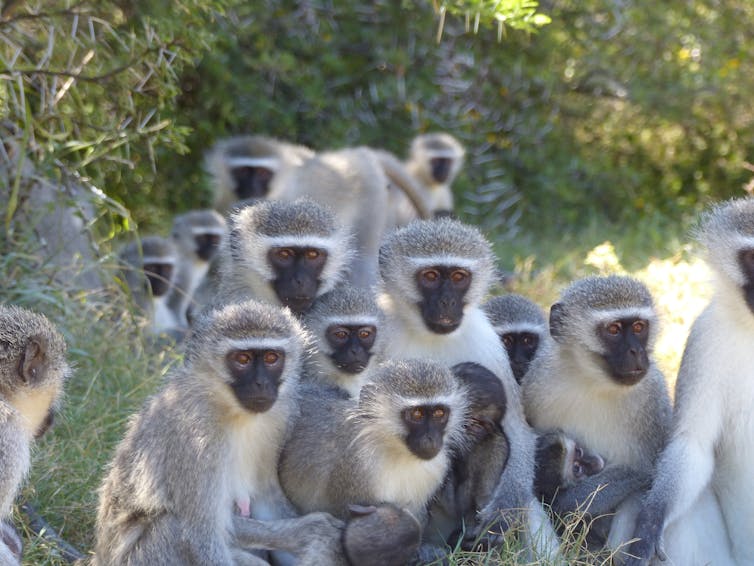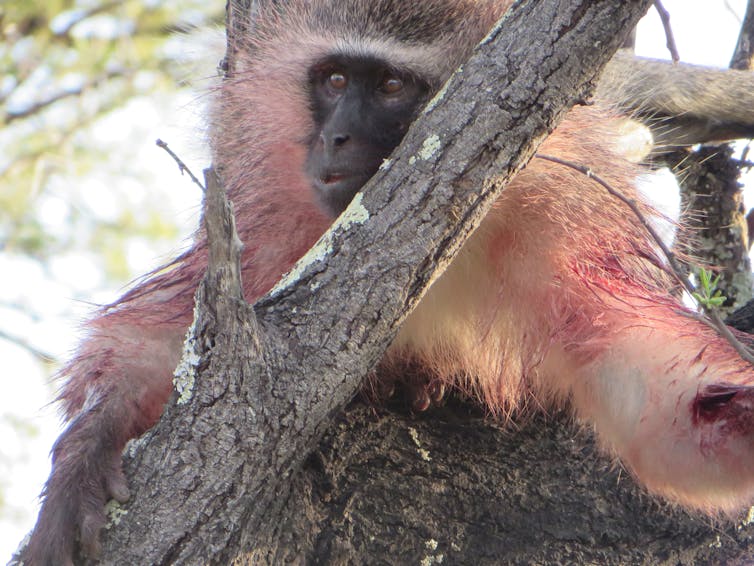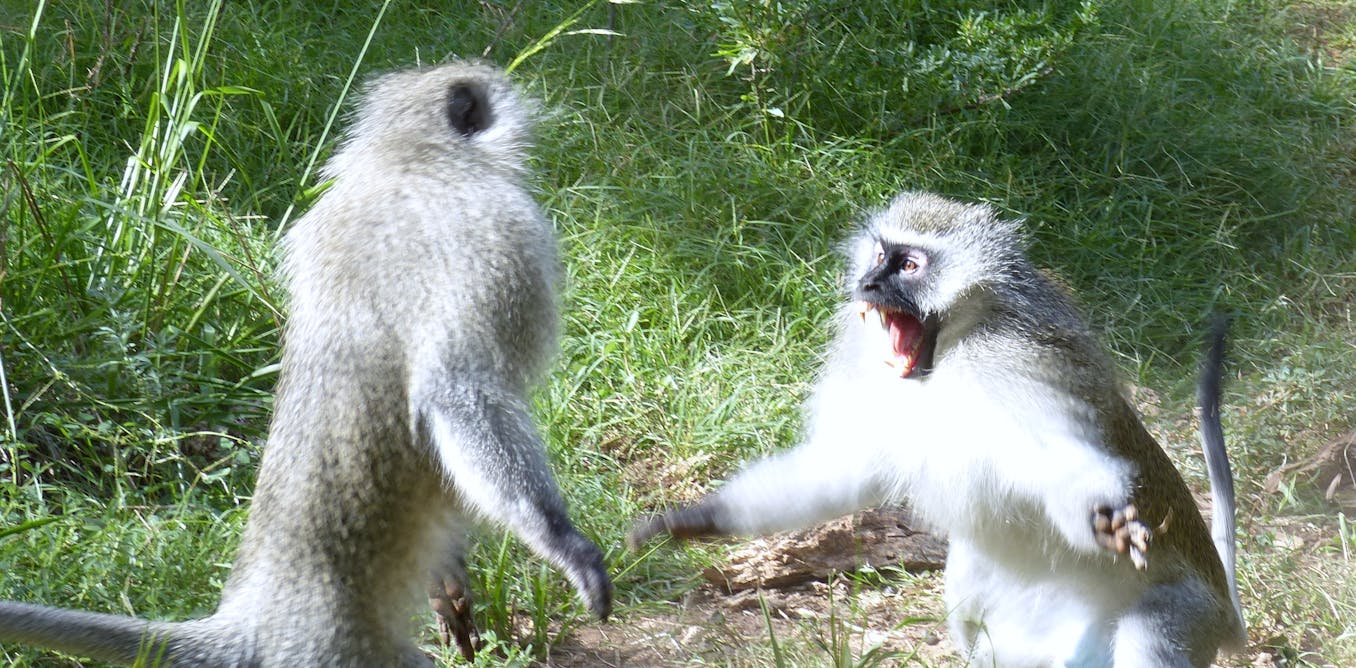[ad_1]
Life inside the wild is perhaps strong, and customarily animals don’t have the luxury of taking day journey once they’re sick. That’s undoubtedly the reality of life for vervet monkeys dwelling in Southern Africa, although parasites and viruses are an ever-present a part of animal life.
Everyone knows how people reply to an an infection. Lack of urge for meals and staying in mattress or resting are among the many strategies we adapt to being unwell. Being a lot much less energetic and consuming a lot much less frees up vitality to wrestle the an an infection – even digesting meals makes use of vitality. This behaviour may help us get higher and is a key a part of our survival.
My colleagues and I wanted to know further about how monkeys reply to illness, and the way in which a sickness travels inside and between animal groups. That’s essential if we’re to type out the large have an effect on that an an infection can have on monkey inhabitants survival. Whereas the causes of an an infection have been the focus of quite a bit consideration, until now we knew little or no in regards to the social penalties of an an infection in these monkeys.
For over ten years our worldwide crew of researchers have studied the behaviour and physiology of wild vervet monkeys dwelling inside the Jap Cape, South Africa. They reside in big social troops – as a lot as 40 monkeys per troop – and former evaluation has confirmed that they are routinely uncovered to a range of environmental stressors akin to extreme heat and drought, along with rivals for meals.

Chris Youthful, Creator provided (no reuse)
In our latest look at of three groups of untamed vervet monkey, we examined the impression of getting sick on specific individual vervet monkey’s social standing.
How we studied fever
As with folks, when a monkey will get an an an infection, they will get feverish.
We implanted miniature data loggers – slender cylinders about 3cm prolonged – into each monkey’s abdomen and recorded core physique temperature contained within the stomach every 5 minutes. That allowed us to doc for the first time the prevalence of fever in a wild monkey inhabitants.
After the look at interval, we returned to take the loggers out, with the help of a crew of vets from the Faculty of the Witwatersrand. We needed to try this to get the data, and clearly moreover for the sake of the monkeys.
In our look at group of 59 vervet monkeys, we detected 128 fevers in 43 monkeys over seven years. Feverish monkeys reached a median (indicate) every day physique temperature of about 39°C, with the most effective physique temperature on report being virtually 42°C. Fevers lasted between two and 20 days.
On the same time, we saved an in depth account of the monkeys’ behaviour and social interactions. Just like us, they lose their urge for meals and spend further time resting. Nonetheless they will’t maintain out of movement for too prolonged. Even sick monkeys should maintain with their troop in the event that they’re to keep up themselves out of attain of predators, akin to cheetah, jackal and caracal (a wild cat). Monkeys moreover depend upon their group mates to help wrestle off neighbouring troops as they compete for meals, water and sleep web sites.
The prospect of assault
Together with the behavioural penalties of fever, we had been ready to current, for the first time, a hidden and beforehand unrecognised worth of social interactions – feverish monkeys had been attacked whereas they’d been down.
Inside a monkey troop, rivals is rife – monkeys battle for meals, standing and mates. Although it’s unclear if a monkey is conscious of that one amongst their troop is sick, they do recognise the weakened state of their troop mate, possibly on account of they’re out of varieties or are a lot much less aware of additional refined exchanges of dominance.
Some folks appeared to utilize this to their profit.
We discovered that when monkeys had been feverish they’d been twice as vulnerable to be attacked by one amongst their group mates and 6 events further inclined to show into injured in consequence. Sick animals had been centered with aggression after they’d been least ready to wrestle once more, doubtlessly enhancing the attacker’s social standing, entry to sources, or place inside the troop.
We observed a really unusual sequence of events in a single amongst our troops of 25 monkeys.
Female vervets reside in comparatively safe hierarchies. Nonetheless when Brie, the alpha female, fell ailing she was subjected to a torrent of abuse from the troop’s beta female, Tyvara. Over seven days, Brie was attacked by her on 12 occasions and bought 4 utterly totally different accidents. For positive, Brie’s alpha dominance standing was no further and he or she slipped down the hierarchy.

Rosemary Blersch, Creator provided (no reuse)
Bystanders moreover appeared to be taught from the weakened standing of a sick specific individual, on this case by manoeuvring up the hierarchy, and these fever-induced social interactions are vulnerable to have important long-term social and well being penalties for the folks involved.
Study further:
How orangutan mothers help their offspring be taught
Nonetheless that’s not all. The feverish monkeys spent merely as quite a bit time grooming, or being groomed, by totally different group members although they’d been sick. Whereas it would sound widespread sense to steer clear of totally different sick folks, our findings advocate that social engagement possibly shows a trade-off between the propensity to get contaminated by a contagious specific individual and the social value and totally different benefits that the connection affords – akin to the flexibleness to handle in troublesome environments and effectively elevate offspring. Or possibly monkeys merely don’t know that their troop mates are ailing or would possibly transfer them a nasty illness.
The response of vervet monkeys to an an infection signifies that the unfold of sickness among the many many troop might be going. Now now we’ve seen that there is a worth of being sociable when feverish, the place inclined persons are open to assault, possibly we should always all the time flip our consideration to the question of the have an effect on of social integration amongst monkeys on the unfold of sickness inside and between groups.
[ad_2]
